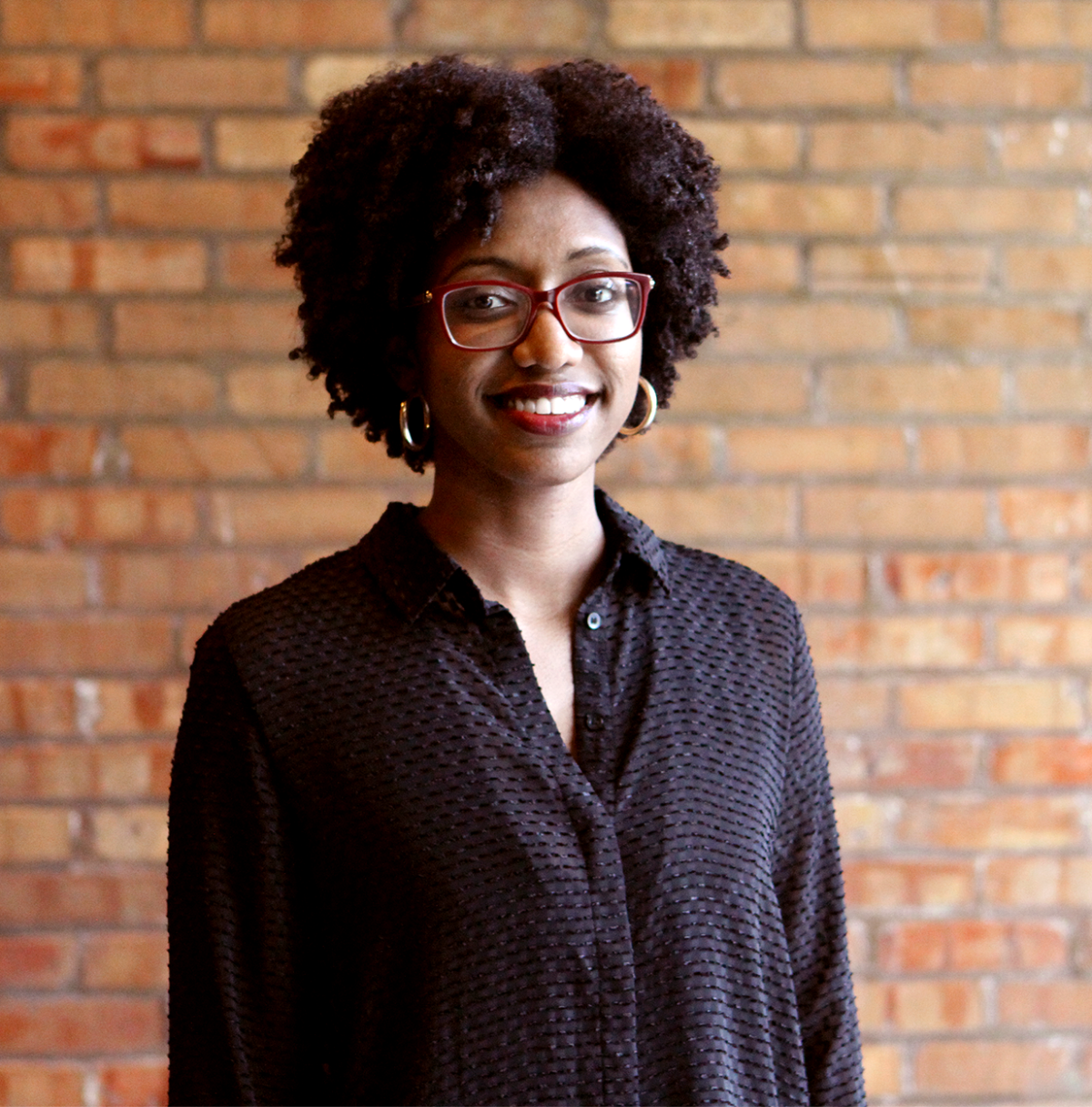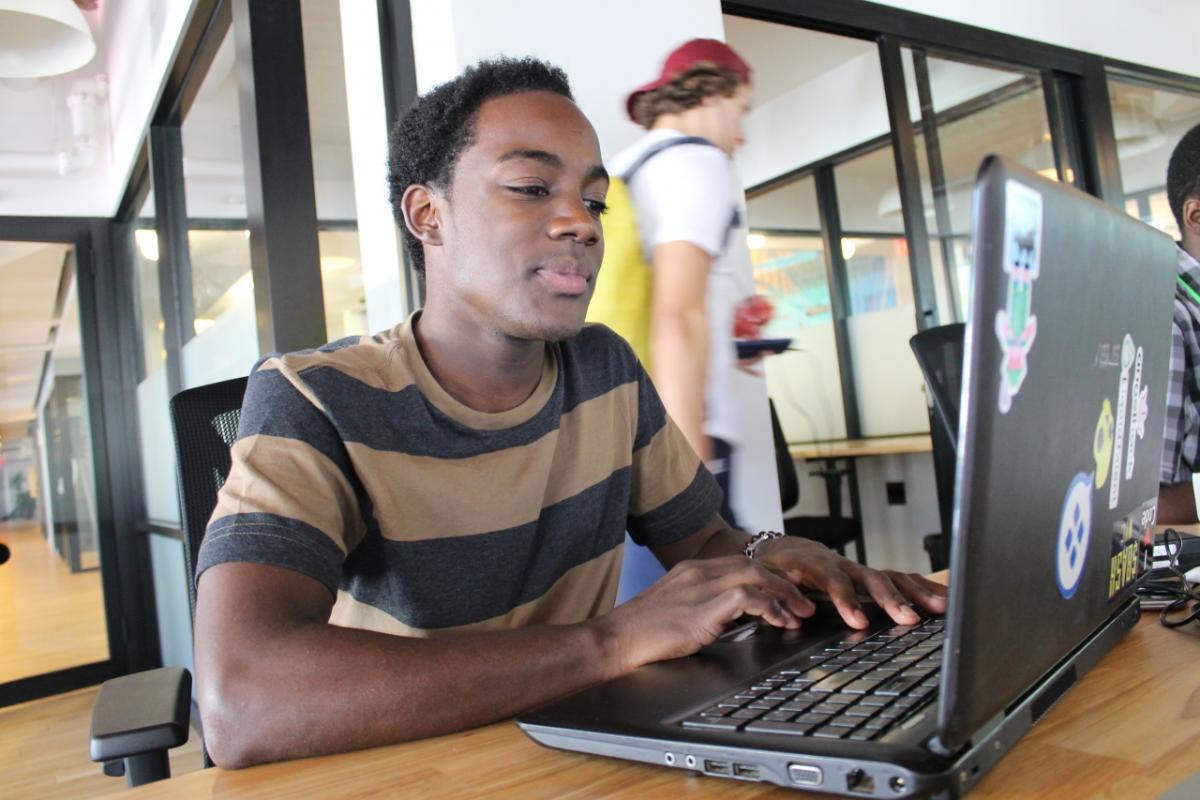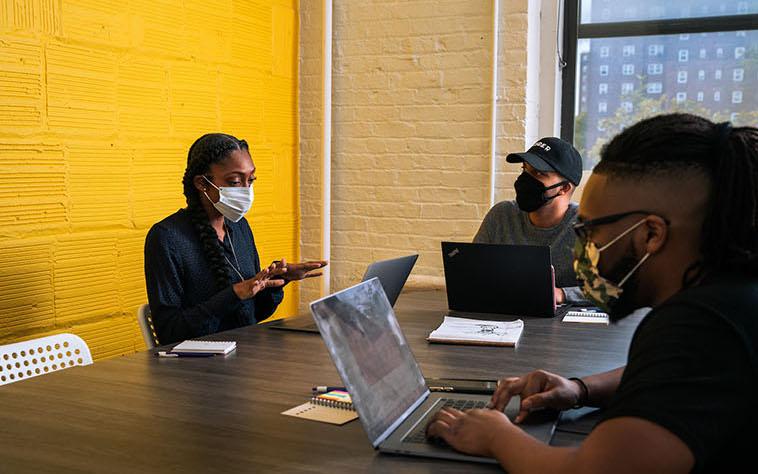Black Leadership Spotlight: Jerelyn Rodriguez, The Knowledge House
In celebration of Black History Month, Common Impact is spotlighting remarkable Black nonprofit leaders and their many contributions to creating more positive, healthy, and equitable communities.
Today we hear from Jerelyn Rodriguez, Founder & CEO of The Knowledge House, a South Bronx-based nonprofit committed to building a diverse pipeline of tech talent from low-income communities as a critical step in achieving its broader vision of alleviating poverty. The Knowledge House provides high school students and young adults with training, fellowships, and internships to prepare them for successful careers in technology. Like Jerelyn, all staff are people of color who hail from the same communities as these fellows.Learn more about The Knowledge House and opportunities to get involved through volunteering and corporate engagement, including participating in special events, leading workshops, mentoring fellows, and lending expertise on the Tech Advisory Board.
Tell us about your role as CEO of The Knowledge House. How have you led during the pandemic?As CEO of The Knowledge House, I run business operations, all external affairs, and fundraising. Our co-founder & CTO, Joe Carrano, leads all the technical instruction, the teacher training, and the technology we use, especially now that we’re virtual. Since the pandemic, my job has gotten so much harder, but it’s paying off. I’ve been working longer hours, probably 10-12 hours per day since March. That’s because we’re not fully staffed; because of COVID, we had to freeze hiring and let all our consultants go.
We were understaffed and the volume of work actually increased – aside from contingency planning and emergency budgeting – but it all yielded good results. We had our highest performing cohort in history and we raised more money last year. Part of that was our PPP loan being forgiven. I know we were one of the few nonprofits in the Bronx that was able to get a PPP loan.
Also, after the murder of George Floyd, a lot of the companies we work with were interested in funding us. They gave us grants so we could equip our job trainees with technology or cash assistance. The NBA, for example, launched a whole foundation and The Knowledge House was an inaugural grantee.
A lot of good opportunities came out of the pandemic, so as a leader I just had to be responsive. Of course, all of us struggled with work-life balance – maintaining your sanity and your mental health – so I had to be really strategic with my time. A lot of self-awareness was required for me to be more efficient, work smarter. Any leader – especially founders – in moments of crisis, the only thing you can do is fill in the gaps and make sure things are in motion.
And I didn’t do it alone. I asked my board to step up and I held them accountable. I said, “Look, if you want us to survive the pandemic, you have to reach out to more people in your network, ask them to donate. You have to connect us to more capital, more corporate partners.” That’s also part of leadership: getting help and making sure everything is sustainable.
Despite the incredible work that Black nonprofit leaders like you do every day, we know that BIPOC-led and serving organizations receive disproportionately less support in the form of donations, grants, and corporate partnerships. How can businesses and philanthropy step up to change the status quo here?I would suggest a few things. I like the momentum I see around foundations prioritizing organizations led by people of color or people that represent the population served. I hope that becomes the norm, and not just because leaders of color have traditionally not received access to funding, but because authentic leadership leads to better results. Just investing in founders that have that lived experience or leaders that are diverse means that the foundations and corporations are going to meet their overall goals.
The one thing to be cautious of is that as foundations invest more in people of color, what they should avoid is creating a new portfolio for people of color that has lower expectations – or higher expectations! I’ve had potential funders say, “You might not be ready for the traditional portfolio, but we’re going to launch a Black portfolio,” and that’s not helpful because it’s not sustainable.
The second recommendation I would offer is that it’s always so helpful when a grant comes with pro bono consulting or management assistance, like when one of our corporate partners, JPMorgan Chase, connected me with Common Impact. Any time there’s more of an investment than the dollars, it means the funder really cares about sustainability. I would go back to that funder that says you’re not a fit in our regular portfolio and say, “If you offered pro bono consulting or professional development, then The Knowledge House can be ready to be as competitive as the folks in your traditional portfolio.” At the end of the day, that’s what’s sustainable. All foundations should create more room, not create a whole different bucket.
At the heart of Common Impact’s work is a focus on alleviating inequality. How does The Knowledge House alleviate inequality?Through our job programs, we’re trying to increase access to economic opportunities. When we started The Knowledge House, I learned that there are high-tech, high-paying jobs out there that don’t require a college degree, so that means those opportunities are available to the population we serve.
Specific to the Bronx, I think it’s the borough that’s often left out, left behind, or the last to be recognized. But I also think – being from the Bronx – that Bronx residents are so innovative and creative. We’re pioneers. We historically have created things. I think that opportunity to empower people of color and low-income communities to become producers versus just consume is so important. We started The Knowledge House not only so that people have access to high paying jobs, but to empower people to be innovative, and we wanted to make sure the Bronx was not left out of the innovation economy.
Now, when it comes to COVID, it made the unemployment rate in the Bronx shoot up to 25%. Applications for our job training programs also jumped up 90%. The private sector is undergoing a digital transformation, so tech training specifically is directly aligned to having a more sustainable career and taking someone out of poverty.
Digital skills training is needed now more than ever, and the skills and employment opportunities we provide to our population can be game changing. The average incoming wage or salary for a Knowledge House applicant is $14,000. We have 40 job seekers currently enrolled in job training and three of them have already gotten full-time engineering roles before the program is over. The starting salary for all of those roles has been $80,000. It’s amazing – we feel really good!
How has The Knowledge House leveraged skills-based volunteer opportunities and how has it helped your organization deliver on its mission?Our favorite funding partnerships are those that come with consulting. I have two examples of skills-based volunteering opportunities that were so impactful. One was in 2019 when we were matched through Common Impact to a team made up of JPMorgan Chase professionals. They did a market analysis for us on six regions we could potentially expand into. The skilled volunteer team researched the demographics and needs of local low-income workers, potential employers, existing tech companies, funders, and other partners that we could work with in those regions. From those six markets, they helped us solidify three that this year we are going to expand to. In 2020 we had paused our national expansion plans, but we had a successful year, so we’re going to move ahead full speed. It would not have been possible without those JPMorgan Chase employees helping us with the market analysis.
Most recently, just a few months ago, we worked with Common Impact again at Skills for Cities. We were matched to a team of marketing professionals from different companies for a full day of skills-based volunteering. Our challenge was really trying to be responsive to this moment we’re talking about with corporations. Traditionally, corporations have volunteered with our students, but the goal really was to have them invest. Just understanding how to market volunteer opportunities, hiring partnership opportunities, and funding opportunities to corporations was a challenge.
The team looked at our collateral and gave us feedback that, especially at a corporation, there are so many stakeholders that you have to reach out to and you need different collateral for all of those folks: the CSR lead, the HR team that is hiring, the technologists and the ERG groups, and of course marketing. Because each team has a different goal, even though there’s overlap, a specific message will compel them to act, and if we made our communication strategy more robust and our content more compelling and if we used different types of content, then we would be more successful.
And so we tried it. We launched the fundraising campaign during Q4 of 2020 and it was a lot of different content: video, social media promo, and a virtual event series. In total, we raised $500,000 from corporate giving! Now that we have that success story, we can replicate it and integrate it into the organization so that it happens every year. We can project it, make goals around it, and keep increasing corporate giving and, ultimately, keep increasing employment opportunities for the students that work with us.
These are two projects that are still living and breathing at The Knowledge House, so we’re very grateful for skills-based volunteering opportunities.
Who are some of your favorite Black leaders and changemakers?I really stay motivated by having Black women leaders around me. The Knowledge House’s Board Chair is a Black woman and she’s been mentoring me for years now. Her name is Charizma Williams and she’s the Chief Financial Officer of the ACLU. She inspires me because she’s a leader at this huge national nonprofit and their everyday goal is to increase equity and access, and to see her be a leader there is inspiring.
My Vice Chair is Bruce Lincoln and he’s the founder of Silicon Harlem. I bring him up because COVID really highlighted the inequities around tech and connectivity, in the Bronx especially. Silicon Harlem has been working on a broadband-for-all initiative for five years now and we just started working on that in the Bronx, so to have someone in the borough next door that has done this work, they know the good, bad, and ugly of taking on an initiative like that – and it’s one that’s so needed right now. It’s inspiring to have people in my own community that are making a difference every day and it’s the fact that they lead The Knowledge House with me.
Especially as philanthropy starts to highlight more diverse leaders, there are just more role models to look up to. I just got to meet Samantha Tweedy at Robin Hood Foundation who is the Chief Partnerships & Impact Officer and she is so amazing! Before Robin Hood, she was running a charter school network. I’m a charter school alum and when I was in school growing up, I didn’t see enough Black and Brown leaders at these big charter school networks, so to know that’s changing is great.
What brings levity to your day or work?What keeps me going – besides having mentors that work closely with me – is hearing thanks and notes of gratitude from alumni and students. Especially because everyone is virtual, it’s just easier for them to get in touch with me. Anyone can just Slack me, so I get a lot of thank yous and social media shout outs and that feels good, especially during a moment of crisis. That keeps me going.




